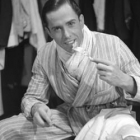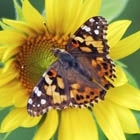Chapter Three - Foreign Residences
Mourning for the accident struck Grand Duke Paul's palace. The black shadow of death, inconsoleable pain, the fear over the fate of the baby, all this sadness would not permit Grand Duke Paul's aching soul to heal. The doctors gave no hope at all for the survival of Dmitri Pavlovich. Grand Duke Paul struggled with the dread of this misfortune in his palace and could not find consolation. After a while, he had become a shadow of his former self. The doctors who cared for him, lead by Dr. Turgeniev, decided that the Grand Duke had to leave the country in order to get back his physical health and recover his moral balance. An unexpected obstacle arose, however. The doctors had ordered the Grand Duke to have massages during the course of his voyage. The Grand Duke most clearly refused to engage the services of an outside masseur, someone he did not know, some stranger. Dr. Turgeniev found a solution: he offered to teach me, over several days, how to do medical massage. Our studies went quickly and well, and so, to the list of my duties as Director of the Grand Ducal Wardrobe was added that of masseur.
As he was leaving for abroad, Grand Duke Paul left his young children in the care of his brother and sister-in-law, Grand Duke Serge and Grand Duchess Elisabeth. It had come about that the Grand Ducal couple had become very attached to their niece and nephew who- as fate would have it - had escaped from the jaws of death. We had learned, in the suite, to the effect that the revolutionary Kalayev, who closely followed the comings and goings of Grand Duke Serge in order to assassinate him, had on several occassions come near to the Grand Duke's carriage, bombs in hand, but Kalayev saw the children and refused to throw the bombs, so as not to spill the blood of the innocent children. Kaleyv, directed by Savinkov, waited for Grand Duke Serge alone, and finally killed him in 1905.
Our first stop on this new voyage was in Coburg. The Grand Duke, as well as myself, was accompanied on the voyage by his aide-de-camp Efimovich. The Grand Duke had gone there to see his sister Marie Alexandrovna, Grand Duchess of Coburg-Gotha. Nevertheless, we were not to stay there very long; the Grand Duke wanted to get to Italy quickly, for the sun, that heat which his body tortured by disease and sorrow needed so much. Alas, we were not to have any such luck. We had gone to Naples, Florence, Rome, Venice - everywhere we found miserable weather, rain, cold and damp. This made the Grand Duke even more upset. He was complaining of the terrible weather and was not the least bit content. In truth, the autumn of that year was one of the most unpleasant. We had stayed away from our home for almost two months and then returned to St. Petersburg for the Christmas holidays.
Despite all of the unfavorable circumstances of our voyage, it still was of benefit to Grand Duke Paul. He had become stronger, less sad, and his taste for life had returned.
The Grand Duke, after this voyage, returned abroad every autumn. His military service would not prevent it. As Squadron Chief of the Hussar Regiment of the Tsarskoe Selo Guard, the Grand Duke commanded, after his marriage, the regiment of the Chevalier Guards and so, if he wished, with the Emperor's permission, he could be absent for more or less long periods. I single out one trip of these voyages, the second time to Coburg, for the engagement of marriage of the future Emperor Nicholas II to Princess Alix of Hesse-Darmstadt, during Lent 1894. All of the Grand Dukes - even Constantine Constantinovich, Regimental Chief of the Praeobrazhinsky, even he too, had gone there together. The Grand Duke had gone from Petersburg to Coburg so as to escort his Regimental Singers who took part in the ceremonies held in the little orthodox chapel.
I remember my first meeting with the future empress more particularly. I had been charged by Grand Duke Paul to take a valuable gift over to the Princess on his behalf. I had gone into the apartment she occupied in the palace at Coburg and found here there in one of the small salons of the palace. She was seated on a sofa next to her fiancé. When she noticed me she was very flustered and got up and went to the window. The future emperor, to the contrary, greeted me in a most friendly way: "Ah, my dear Volkov, what good news do you have to report?" I told him the reason for my visit. Then, the tsarevich asked his fiancé to approach, he explained who I was and why I had come. She was very pleased with the gift and gave me her hand, which I kissed and then took my leave.
We spent nearly three weeks in Coburg, all very happy and entertaining. It was Grand Duke Vladimir Alexandrovich, above all, who was animated by all the gaiety and by the variety of the company in which he found himself. It was on this occassion that I saw Emperor Wilhelm II for the first time. His behavior, on this occassion, was not only extremely modest, but at times even obsequious. He had come to help the Grand Dukes with their cloaks. We felt, in general, that he made these efforts simply to please the members of the Imperial Family. However, his efforts did not succeed in arousing any particular sympathy from them.
In the autumn of that same year, 1894, Grand Duke Paul was to go to England, accompanied by Grand Duke Serge Alexandrovich. The reason for the voyage was the arranged marriage of Grand Duke Paul to one of the English Royal Princesses. The preparations for the journey had already been made, the bags and trunks all packed, when a dispatch from Livadia arrived, announcing the worsening of Emperor Alexander III's illness. We immediately repacked the contents of our trunks and left for the Crimea.
We stayed a week at Livadia. We found the Emperor dying. Livadia Palace was filled with medical specialists, called in from all over the world. These learned practitioners, though, were powerless to heal the illness which was taking the life of the Emperor. Among the celebrities tending to the Emperor, the most distinguished of them was Professor Zahrine of Moscow, who stood out by reason of his bizarre behavior. The professor could not even take a few steps in the rooms of the palace without sitting down to rest. Also, he would avail himself of every armchair along his path to the Emperor's bedroom. At the same time as the doctors had been called, at the Emperor's request the famous Bishop Father John of Cronstadt (who had the reputation of being a saint who performed miracles) had also come to Livadia. We all went to meet him and receive his blessings. All went well, right up until the moment when one of the men in service at Livadia approached the Holy Father to receive his blessing. The blessing was given, and then Father John fixed his gaze on him and said to the man "and to you, the dark night!" We could only imagine the state of mind of the unfortunate man having gotten this terrible reproach from Father John, who had a reputation throughout all Russia as a saint and prophet. But, happily, this time the fears were not realized. Father John's prophecy was not fulfilled.
On the morning of October 20, Grand Duke Paul came back from the Emperor's bedroom, and told me and then the other servants that it was all over. We asked the Grand Duke if we could go make our farewells to the departed Emperor. He responded that we could. One after another we sadly went into the Emperor's bedroom, where he was no longer sleeping in the bed, but was now sitting in a large archair, dressed in his bed robe, exactly as death had taken him. Next to him was Empress Marie Feodorovna, who kissed him. We bowed and kissed the deceased Emperor's hand and saluted the Empress. That same evening we attended the funeral services for the repose of the soul of Alexander III. After that, we then swore our oath to the new Emperor, Nicholas II, and the following morning left Livadia.
Comments on this site should be directed to Bob Atchison.

